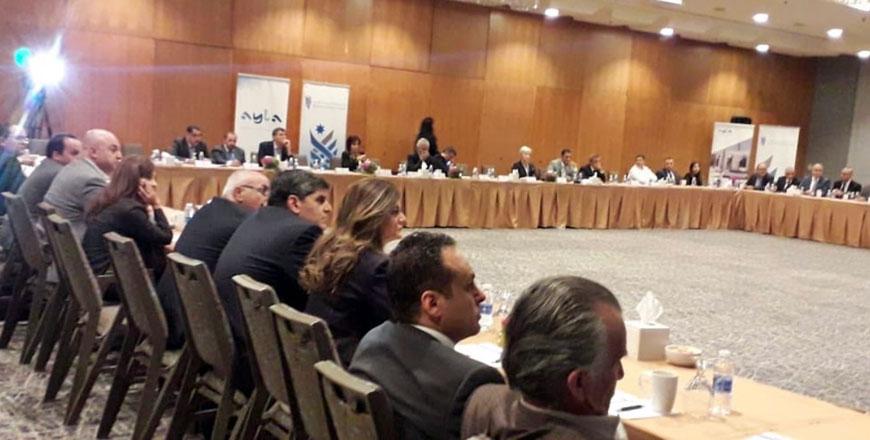You are here
Stakeholders in JSF dialogue outline proposals for private-public partnership, economic growth
By JT - Feb 18,2019 - Last updated at Feb 18,2019

AMMAN — Participants in a series of dialogue sessions, organised by the Jordan Strategy Forum (JSF), including ministers, officials and business representatives, jointly proposed amendments to the Public-Private Sector Partnership Law to expand its scope of operations.
Prime Minister Omar Razzaz and the ministers of interior, energy, water, tourism, ICT, labour and planning partook in the sessions.
The proposed amendments aim to expand the projects mentioned in the law to also include schemes that are not exclusively pertaining to infrastructure.
The JSF on Monday issued a report, cited by the Jordan News Agency, Petra, highlighting steps that stakeholders see as necessary to enhance the partnership between the public and private sectors so as to create more jobs and stimulate economic growth in all sectors.
During a session on investment and business entrepreneurship, attendees agreed to develop a plan to promote the Kingdom as regional centre for technology and professional services, as well as issue regulations related to incentives provided for companies that invest in Jordan’s ICT and service sectors.
To speed up and facilitate the procedures for foreign investment in the Kingdom, and to remove any obstacles hindering such ventures in the service sector, attendants agreed to forward a flexible policy that facilitates the entry of skilled foreign workers in accordance to the needs of the market.
They also agreed to draw up an action plan and timeline to revive the Amman Stock Exchange (ASE) through clear procedures that can regain confidence in the ASE and attract more foreign investments.
As for exports, participants agreed to launch a programme that provides funds, guarantees and insurance coverage to stimulate Jordanian companies and address the high costs of loans.
These solutions should facilitate access to funds through programmes adopted by the Central Bank of Jordan to present guarantees and finances to construction and engineering companies working on projects inside and outside Jordan.
Regarding the reconstruction of Syria and Iraq, they discussed a government initiative to develop a plan on the role that the Kingdom has to play in reconstructing Iraq and realising stability in Syria.
Participants highlighted the importance of adopting precautionary measures against risks that may result from the members of the international community’s lack of commitment to contracting terms and conditions, such as refusing to pay.
Regarding the tourism and medical tourism sector, participants agreed to activate the role of the medical tourism unit at the Jordan Tourism Board to act as a reference for all issues related to medical tourism.
They also agreed to develop comprehensive solutions for the sector.
These solutions include technology platforms and applications that cover medical tourist insurance, transport services, appointments, reservations and promote medical tourism sites.
The Interior Ministry highlighted the importance of obliging aviation companies that transfer passengers to Jordan to fill visa applications in full.
The purpose of this measure is to avoid the repatriation or ban of passengers coming into the Kingdom.
The ministry expressed its commitment to consider visa applications for medical tourism within 48 to 72 hours.
On the energy and water sectors, participants discussed tools to expand exploitation of Jordan’s mineral resources.
Attendees proposed granting the private sector rights to extract shale oil.
Participants agreed to explore the feasibility of extracting shale and conduct a cost-benefit analysis of the operation and assign government royalties.
As for the renewable energy sector, participants agreed to establish storage stations for energy through water pumping and launch energy storage projects through batteries, where they agreed to consider the possibility of using solar energy for water pumping.
On finding solutions to address electricity subsidies, mainly for low-income segments of the population, participants in the respective session agreed to have a fixed timetable to provide households whose monthly consumption does not exceed 300 kilowatt-hours with solar energy systems.
Various other water, energy and power projects were discussed, including expanding a number of water and energy facilities.
Related Articles
AMMAN — The Jordan Strategy Forum (JSF) held a roundtable discussion with global directors from the World Bank Group, with the participation
AMMAN — The Jordan Strategy Forum (JSF) held a discussion session with officials from the IFC, a member of the World Bank Group, cover
AMMAN — The Jordan Strategy Forum (JSF) on Wednesday held a dialogue session titled “Enhancing the Competitiveness of the Tourism Sector in

















